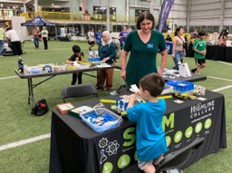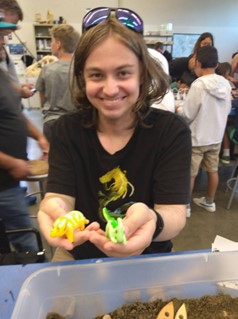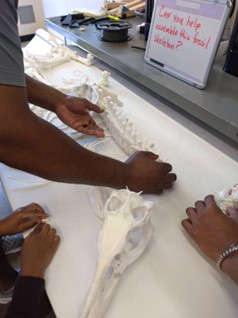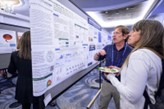Area Report for Board of Trustees
Fall 24 is upon us! Faculty are busy teaching full classes. Tenure working committees are holding the first meetings of the quarter. Post-tenure review committees are scheduling their meetings. Faculty are preparing applications for column advancement as well as applications for Teaching & Learning Enhancement grants. The all-dean team is busy supporting staff in their areas as they launch strategies tied to their institutional effectiveness goals, their Student Success Council SMARTIE goals, and their personal goals. Simultaneously, the deans are working hard to address gaps that came to light in the recent SBCTC audit of our workforce programs and provide meaningful support to professional-technical faculty, especially professional-technical program coordinators. The Ed Tech team is ramping up for a new iteration of Highline’s response to the federally mandated “regular and substantive interaction” review of online courses. The Learning & Teaching Center is off to a strong start, including extending an open invitation for all faculty to participate in a course designed by Auburn University focused on grappling with generative AI across disciplines. It’s a busy time.
I’ve had the honor of attending several events with VP for Institutional Advancement Josh Gerstman recently, including Seattle’s Southside Chamber of Commerce Mayors’ Reception at the Seatac Doubletree where Highline College was recognized as “the” college for the Highline region–Seatac, Des Moines, Burien, Tukwila, and Normandy Park. As is evident in the items below, the Academic Affairs division is focused on implementing and maintaining strategies that support our four strategic goals and serve the members of our Highline community.
Core Theme 1: ACCESS, Reduce Barriers and close equity gaps to access for all community members
- ELCAP continues to serve the large immigrant and refugee community in south King County. In recent years, we have experienced a dramatic increase in immigrants and refugees from Afghanistan, Ukraine, and Africa that has overwhelmed our capacity to meet the demand for our classes. The ELCAP office staff provide support to our students and faculty, conduct student intake, and register all ELCAP students. Last year, the ELCAP Department served over 6,500 students (over one quarter of the college enrollment) and is projected to serve the same number this year. Our dedicated staff ensures our department continues to serve our community needs.
- Thirty-two students from Maritime High School enrolled in Marine Science classes at Highline this quarter. Thanks to the faculty of the Pure and Applied Sciences and the dedication of the Running Start team, Highline will provide a Marine Science option to these students and have access to Highline’s outstanding marine science faculty, courses, and facilities. Next quarter, many of these students will be taking courses at the MaST center while earning college credit that will help them become marine scientists.
- The Highline College Library has expanded hours for Fall Quarter: Sunday 2pm – 6pm; Monday – Thursday 8am – 7pm; Friday 8am – 2pm
- A new lactation pod has been placed on the 4th floor of Building 25/the library. With increased open hours, the library is an ideal location for students, faculty, and staff in need of this service.
- Pathway Mapper- New Advising Tool: Highline’s new program map platform, Pathway Mapper, went live over Summer quarter. It offers students an engaging and accessible visual experience–highlighting prerequisites, offering course details at a click, and directly linking to resources like the Catalog. Going into the 2024-2025 academic year, Highline is now offering 130 up-to-date program maps showcasing different pathways through its programs. This includes an expanded inventory of 28 AA-DTA emphasis program maps illustrating how students can prepare for different majors using the AA-DTA.
- Digital Literacy and Skill Building Support: In response to qualitative data from students that was shared by the Institutional Research team at a Student Success Council meeting last fall, Academic Affairs has launched new strategies to support students’ technological proficiency. The team, led by Jenni Sandler, Associate Dean for Accessibility Resources, and Kelly Aiken, Program Specialist in Learning Resources, aims to enhance student success and retention by addressing the technology-related challenges that many students experience. One strategy is providing dedicated support. Kelly was hired to provide one-on-one tech assistance as well as working with students and faculty. The team also created a digital literacy website, which provides information on accessing 1:1 tech support; guides for Highline’s key digital platforms, such as ctcLink, Canvas, HC email, Google Drive, and more; and information about Northstar Online Learning for self-paced skill assessment and improvement. Tim Wrye and the ITS team provided terrific and timely support in figuring out how to make Northstar available to all students through Canvas. Staff and faculty have access to Northstar through our King County Library System accounts.
Core Theme 2: STUDENT LEARNING, Increase educational success, collaborate to improve
- Streamlined approach to assessment launched with focus on pass rates, closing equity gaps: The Assessment Committee (Ellen Bremen, Communication Studies; Lisa Bernhagen, English & Institutional Effectiveness Committee Chair; Natalie Hughes, Physical Education; Mary Kajoka, Business; Patrick Kwon, Mathematics; Tylir McKenzie, Psychology; Aaron Moehlig, Chemistry; Tom Pollard, UX Designer/Developer & Business Process Analyst, Information Technology Services; Angel Steadman, ELCAP; and Monica Twork, Reference Librarian), facilitated a successful roll-out of the revised, streamlined assessment process during Opening Week. Thanks to an ongoing discussion with the Institutional Research team, each discipline and program received customized information about overall pass rates and equity gaps in their areas. Faculty had generative discussions about strategies that are working and potential new strategies. Faculty also provided helpful feedback about additional information that would support further discussions/actions to support students.
- Linked Learning Communities: Research demonstrates that guided pathways increase student persistence and completion because they provide direction and purpose. In a similar way, learning communities are part of a strong first year experience because they allow students to make connections across two courses with other students, their instructors and the content of two different disciplines. Last year, we piloted two sections that established learning communities between U.S. History and English composition courses, and between calculus and research writing courses. This fall we are offering 6 sections serving over 120 students in both Transfer and Prof Tech pathways. Special appreciation to the following faculty members willing to take the journey: Cathy Cartwright (Accounting), Mary Kajoka (Business), Lisa Bernhagen (English), Tracy Brigham (PE), Lauren Hatch (English), Amy Rider (High School Programs), Cory Martin (Healthcare), Laura Soracco (English), Rhiannon Hillman (English), Micala Nist (HOST), Wendy Swyt (English), and Tim McMannon (History).
- Highline MESA provided opportunities for students to visit the Microsoft Campus Inclusive Technology Labs to learn about how technology can provide access to others with disabilities. MESA Students also visited the Northwest XR VR Labs at Bellevue College, an NSF grant-funded program focusing on VR and AI Technologies. In addition, Highline MESA focused on providing STEM Students a new opportunity this summer with our first-ever Summer Tutoring Program. Normally MESA only provides Academic Excellence Workshops (AEWs), an embedded tutoring program, during Fall, Winter, and Spring Quarters. This summer we decided to hire a tutor to ensure that STEM Students enrolled during the summer quarter had a dedicated STEM Tutor available, and to provide newer students an opportunity to get ahead prior to fall quarter. Attendance was lower than we hoped, but we were able to connect with newer students and double applications to join the MESA Program.
- Sheena Hendrix, Director of the Academic Success Center, is launching a Peer Navigator pilot project this quarter for students enrolled in specific classes with historically low pass rates: Drafting 186, Healthcare Professions 106, Hospitality and Tourism 100, and Human Services 101. This initiative aims to enhance student retention and provide targeted support where it is most needed. Like the digital literacy and skill building initiative described above, this project grew out of the data shared by Institutional Research at a Student Success Council meeting about factors impacting student retention.
Core Theme 3: COMMUNITY PARTNERSHIPS: Create a more inclusive working environment and a more valued, visible relationship with communities we serve
- Highline College is collaborating with Puget Sound Educational Service District on a Career Connect Washington program builder grant focused on building a pathway for working paraeducators into the Elementary Education teacher certification program with a focus on diversifying the teacher workforce. We are currently working on a strategy for engaging participants, providing a structured platform for Career Launch program strategic building and decision making to address the education demand throughout King County and a regional coordination and systemic support for the PSESD Paraeducator to Credential Teacher Pathway program. Thank you to Tanya Powers, John Pizarro and Ricaflor Fontillas for their work on this project.
- DSHS I-BEST Paraeducator Cohort: For a second year, Highline College is partnering with DSHS to offer an I-BEST paraeducator cohort. This is a quarter-long program. The intent is for the DSHS cohort students to find employment as a paraeducator in a local school district at the end of the program. This is responding to the community need that most school districts are severely understaffed with bilingual paraeducators. This is a collaboration coordinated by Justin Farris in our Continuing Education department, and Steve Washburn in ELCAP. This year the cohort is being taught by Patricia McDonald (Education Faculty) and Shannon Waits (ELCAP faculty). In terms of employment and educational outcomes from last year’s cohort, a total of 21 clients completed the training component of the program. Of those 21 students:
- (57%) worked either full-time or as a substitute paraeducator in the 2023-2024 school year in four districts (Federal Way Public Schools, Kent School District, Auburn School District, and Fife Public Schools)
- (67%) are working either full-time as a substitute paraeducator in the 2024-2025 school year in two districts (Federal Way Public Schools and Kent School District)
- (24%) are continuing their education here at Highline after they completed the Paraeducator Cohort Program, 1 of which is continuing to take ESOL classes at Highline.
- Catholic Community Services (CCS) Cohort: In partnership with CCS, Highline is supporting a cohort of students who are currently employed in the housing and homeless sector to complete a certificate in case management. This 33 credit certificate leads to an AAS in Human Services. Students also have the option to apply their credits toward an AA-DTA. Twenty-five students started in summer, and twenty-seven will continue through spring in a series of linked learning communities. Jennifer Jones (Diversity Global Studies/Geography) serves as lead faculty and teaches in the program, along with Fred Capestany (Human Services), Gerald Jackson (BSTEC 95), and Shon Meckfessel (English). Loyal Allen is the cohort point person in Student Services supported by Nou Lee the Director of Workforce and her team.
- STEM programs at Highline partnered with Starfire Sports at the Tukwila Cup to provide STEM-related activities for the thousands of soccer players and their families who attended. Thanks especially to Katie Baker (LOGS department) who staffed the booth most of the day.


- The Bring Your Kids to College Program continues to serve the community and to engage families in STEM. Recent workshops included Space Physics (July) & Dinosaurs (August).


Core Theme 4: CULTURE & CAPACITY: Promote a campus culture which fosters equity and inclusivity supporting employee growth and development, and institutional capacity for transformation
- Highline College will be hosting Indigenous People’s Day on October 14th with guest speakers, Elise Bill-Gerrish from the Muckleshoot tribe and Archie Cantrell from the Puyallup tribe. The planning committee included Luckisha Phillips, Mia Bull, Ricaflor Fontillas and Tanya Powers.
- The Instructional Leaders group, which includes program managers, associate directors, directors, associate deans and deans in Academic Affairs held their annual retreat at the MaST in September. Facilitated by Jennifer Joseph-Charles (High School Engagement & Academic Success) and Crystal Kitterman (Continuing Education), with support from Nicole Coope (Kanoa Consulting), members of ILG reflected on the ILG pillars, core values, and the work of last year, and then brainstormed how we can create a community of belonging, build trust, and implement systems that will set a strong foundation for the year. As part of that work, ILG members reviewed the draft work plan for Academic Affairs. Discussion ensued about how to support collaborations across teams within our division, as well as collaborations across divisions when we discover we are working on similar projects.
- Cathy Cartwright (Accounting) and Terry Meerdynk (Math) have been working with Gabrielle Bachmeier (Dean for Workforce Partnerships & Extended Learning) to update resources for faculty department coordinators. At the recommendation of Cathy and Terry, many of the resources will move from a Canvas course to the Academic Affairs website. While more work remains to be done, we are slowly but steadily making progress in documenting processes and sharing resources aimed at supporting our hard-working faculty.
Division Honors and Achievements
- The Pure and Applied Sciences Division, and especially the Chemistry Program, celebrated Steve Marfiak’s 16 years of service to the college as the Chemistry Lab Technician. Steve will retire on October 1st. Steve has served the chemistry program, led by his fantastic knowledge, helpful support, and dedication to the financial stability of the chemistry labs. His legacy with students, often behind the scenes, is powerful.
- Aleya Dhanji (Physics) and Dr. Eric Baer (Geology) were invited participants in the 2024 Improving Undergraduate STEM Education Summit in Washington D.C. (June). This Summit, convened by the National Science Foundation and the American Association for the Advancement of Science, brought together the 500 or so principal investigators who are researching how to improve STEM undergraduate education in the United States.

- Aleya Dhanji (Physics) delivered the keynote workshop at UW for a mini-conference “Supporting Underrepresented Groups and First-generation Students” at the University of Washington Physics Department. Dr. Dhanji’s talk was titled ‘What’s Your Superpower? Creating a Culture of Care and Accompliceship to Transform the Underrepresented Student Experience’ and discussed actions we can take that use relationships as a foundation for learning and success, shift advising to a strengths-based approach, and demystify the hidden college curriculum.
- Helen Burn (Mathematics) published multiple articles over the summer. The first two are from her work as part of a team of researchers who did a policy scan of the 50-states; the second is a 2023 panel at ADSA (Academic Data Science Alliances) in the inaugural edition of MAA’s new Scatterplot journal for data science.
- Burn, H., White, T., Atkinson, A. J., Kozak, K., & Zoellner, J. (in press). 50-State scan of higher education policy on post-secondary mathematics education. MAA Focus.
- Burn, H., White, T., Atkinson, A. J., Kozak, K., & Zoellner, J. (2024). A comprehensive examination of state-level practices and policies in college mathematics education. MathAMATYC Educator, 15(3), 4-9.
- Saidi, R., Burn, H., Baumer, B., Black, J., Debzani, D., & Drozda, Z. (2024, August 23). Building ramps and pathways into data science in K-12, minority-serving, and two-year colleges. Scatterplot 1(1), https://doi.org/10.1080/29932955.2024.2395091
- In September, Eric Baer (Geology) presented work on his development of modules to support quantitative skills for geoscience majors at the 2024 Annual Meeting of the Geological Society of America in Anaheim, CA
Report submitted by Vice President of Academic Affairs, Dr. Emily Lardner

